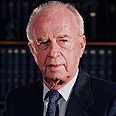
Country for all its citizens
Op-ed: Alongside his efforts to advance peace, Rabin also recognized the need to promote equal rights for Israel's Arabs
Eighteen years have passed since the murder, but the debate surrounding "Rabin's legacy" continues. Usually it is linked to the diplomatic efforts of the late prime minister, which were at the heart of the incitement campaign that preceded his assassination. But alongside the diplomatic legacy, Rabin and his government passed on other, no less important legacies.
One of them is the commitment to change the order of national priorities and diverting the government's efforts toward the periphery and toward expanding the social services basket. Another is the legacy regarding the relations between the Jewish majority and the Arab minority in Israel. Rabin's government was the first to define the advancement of civil rights as a strategic goal.
The political cooperation between Rabin and the Arab parties broke, for the first time, the barrier of the political exclusion of the Arab public. For the first time, a Knesset member from the Arab sector was appointed to the position of deputy minister. A clear indication of this turnaround was the Or Commission report on the bloody events of October 2000. The report indicated a clear change during the Rabin administration in the traditional attitude of the government and its branches toward the Arab public and its distress.
The recognition of this legacy is particularly important in light of the fact that the leaders who came after Rabin did not succeed, and never really tried, to keep this momentum going. This legacy was replaced by increased suspicion and hostility between Jews and Arabs in Israel. Instead of mediating and working to calm the situation, the political leadership moved between closing its eyes and fueling the flames, as it did in the period leading up to the assassination. The law enforcement agencies and the education system are failing in their job to set red lines and present a moral and practical alternative of coexistence. Following the murder, harsh rhetoric, incitement and leniency towards "wild weeds" became illegitimate tools in the political struggle against a compromising government - but were routinely used when it came to Israel's Arabs.
Paradoxically, despite the dire condition of the diplomatic process, most of the Jewish public adopted Rabin's basic principles vis-à-vis the Israeli-Palestinian conflict. Even some of those who stood on the inciting balcony in Zion Square, including Sharon and Netanyahu, eventually embraced significant portions of this legacy. But this process completely passed over the issue of the relations between the state and its Arab citizens. While the Arab political leadership also played a part in the deterioration of the discourse, significant parts of the public created the equation according to which the willingness, in principle, to divide the land justifies the complete disregard for Israel's Arabs and their needs.
Another expression of this reality can be found in the current government's platform, which makes no mention of the Arab citizens and the need for a governmental effort to bridge the gaps and promote coexistence. Perhaps this is not surprising, considering the fact that as opposed to Rabin's two administrations, the current government does not have even one Arab minister, deputy minister or director general.
Rabin Memorial Day is marked each year at the beginning of the Knesset's winter session, and this year it also fell on the Druze and Muslim holiday of Eid al-Adha, the Feast of the Sacrifice. During this session the MKs are expected to discuss measures that will further deteriorate the relations between the Jewish majority and the Arab minority. When these discussions begin, the MKs should think of Rabin - the first sabra prime minister who dedicated his whole life to ensure the sovereign future of the Jewish people, but the same time recognized the need for equality between Jews and Arabs in Israel.
Rabbi Gilad Kariv is executive director at Israel Movement for Reform and Progressive Judaism
- Receive Ynetnews updates directly to your desktop










